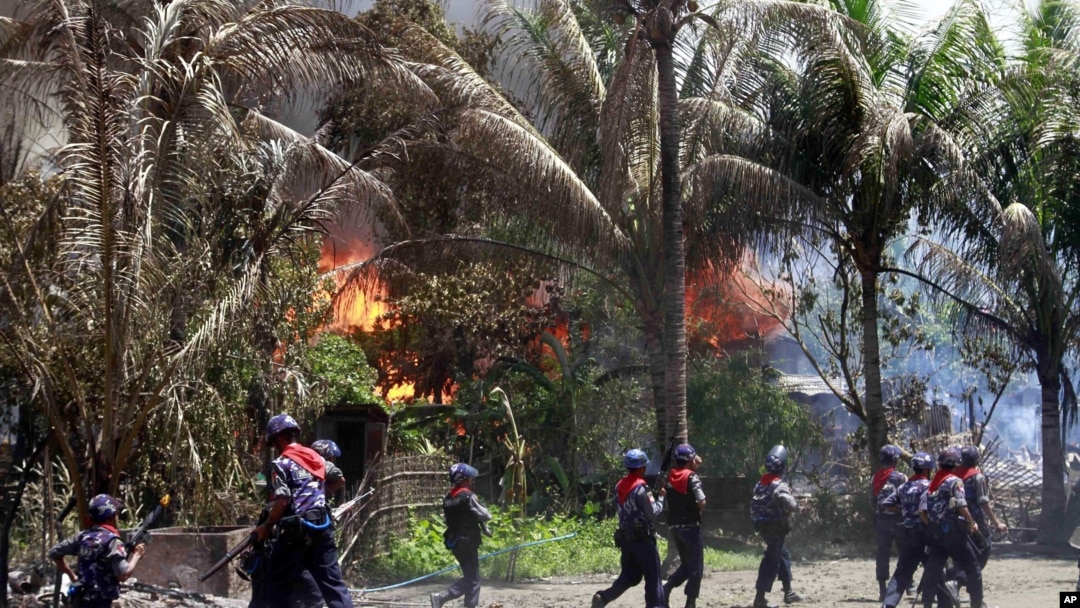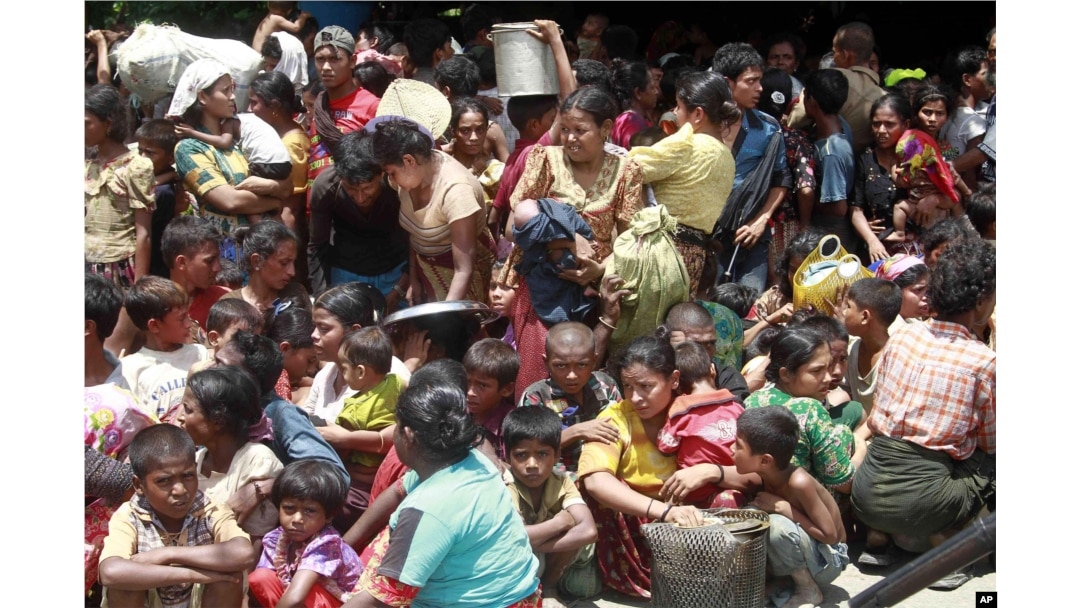BANGKOK - Continuing tension in Burma’s Rakhine state has observers worried the ethnic and sectarian conflict could spread.
Sectarian violence continues in Sittwe, Burma, where ethnic Rakhine residents told VOA by phone that fires are still burning, destroying homes and shops as ethnic Rohingya flee riot police.
In Maungdaw, residents reported mostly peaceful streets, and 400 kilometers away in Rangoon, a small mob of monks was quickly dispersed by police at Sule Pagoda.
The violence has led to fears that conflict could re-ignite old ethnic feuds.
Human Rights Watch Deputy Asia Director Phil Robertson says there are reports riot police deployed to the region are favoring the ethnic Rakhine over the Rohingya. He says the government must be more even-handed in resolving the problem.
"Certainly it has the potential to significantly tarnish the reformist credentials of this government if they are not able to resolve this very serious sectarian violence,” said Robertson.
Robertson says that with Burma’s many different ethnic groups, the country’s future depends on becoming a democratic, progressive, multi-ethnic state.
“There are just too many ethnic groups living close together for this kind of violence between two ethnic groups to be allowed," he said. "Because unfortunately it will empower extremists who have grievances against other ethnic groups, that is the danger here."
Although the Rakhine ethnic group has suffered oppression at the hands of the government for decades, domestic media coverage of the riots has been tilted against the Rohingya population. State-backed media and private news outlets have reported on the conflict using derogatory terms for Rohingya.
Speaking from London, Rohingya activist and scholar Knurl Islam says there is long history of trying to exclude the Rohingya in Rakhine.
"We are two communities. We have been living together for a long time, we are still living together," said Islam. "We have to live together, we know it. But they do not want Muslims, they say we are illegal immigrants, we have nothing to do in their country."
Many Rakhine consider the Rohingya relative newcomers from Bangladesh who do not qualify for Burmese citizenship.
A member of the Rakhine Nationalities Development political party, Hula Saw, says Rohingya have long sought rights they do not deserve.
“We have to give them their due human rights, but we do not accept them as having nationality rights,” said Saw.
As violence continues, many Rohingya are reported to be fleeing the state by boat and by land. Bangladesh has not opened its borders to those fleeing the conflict.
Sectarian violence continues in Sittwe, Burma, where ethnic Rakhine residents told VOA by phone that fires are still burning, destroying homes and shops as ethnic Rohingya flee riot police.
In Maungdaw, residents reported mostly peaceful streets, and 400 kilometers away in Rangoon, a small mob of monks was quickly dispersed by police at Sule Pagoda.
The violence has led to fears that conflict could re-ignite old ethnic feuds.
Troops Patrol Western Burma as Sectarian Strife Continues
Human Rights Watch Deputy Asia Director Phil Robertson says there are reports riot police deployed to the region are favoring the ethnic Rakhine over the Rohingya. He says the government must be more even-handed in resolving the problem.
"Certainly it has the potential to significantly tarnish the reformist credentials of this government if they are not able to resolve this very serious sectarian violence,” said Robertson.
Robertson says that with Burma’s many different ethnic groups, the country’s future depends on becoming a democratic, progressive, multi-ethnic state.
“There are just too many ethnic groups living close together for this kind of violence between two ethnic groups to be allowed," he said. "Because unfortunately it will empower extremists who have grievances against other ethnic groups, that is the danger here."
Although the Rakhine ethnic group has suffered oppression at the hands of the government for decades, domestic media coverage of the riots has been tilted against the Rohingya population. State-backed media and private news outlets have reported on the conflict using derogatory terms for Rohingya.
Speaking from London, Rohingya activist and scholar Knurl Islam says there is long history of trying to exclude the Rohingya in Rakhine.
"We are two communities. We have been living together for a long time, we are still living together," said Islam. "We have to live together, we know it. But they do not want Muslims, they say we are illegal immigrants, we have nothing to do in their country."
Many Rakhine consider the Rohingya relative newcomers from Bangladesh who do not qualify for Burmese citizenship.
A member of the Rakhine Nationalities Development political party, Hula Saw, says Rohingya have long sought rights they do not deserve.
“We have to give them their due human rights, but we do not accept them as having nationality rights,” said Saw.
As violence continues, many Rohingya are reported to be fleeing the state by boat and by land. Bangladesh has not opened its borders to those fleeing the conflict.



